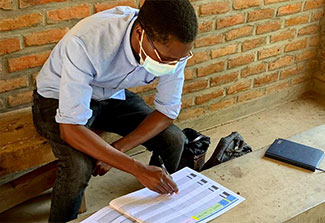Men’s health often neglected in global health research
January/ February 2022 | Volume 21 Number 1
 Photo courtesy of Partners in Hope/Malawi
A Fogarty-funded project is targeting men with a home-based intervention to encourage them to continue treatment for HIV.
Photo courtesy of Partners in Hope/Malawi
A Fogarty-funded project is targeting men with a home-based intervention to encourage them to continue treatment for HIV.
Despite significant achievements in global health over the past few decades, men have not benefited equally and have a life expectancy that is about five years less than women’s, according to WHO data. That gap is widening in Africa and South-East Asia. Work commitments and stigma prevent many men from visiting health clinics. They’re less likely to be tested and treated for HIV, less likely to adhere to treatment and more likely to die from AIDS. In many parts of the world, men tend to smoke and consume alcohol more often than women, which creates additional health risks. Also, men are less often included in interventions to address depression, mental health issues or intimate partner violence.
Historically, men’s health concerns have often been sidelined by global health programs in low- and middle-income countries (LMICs) to prioritize studies aimed at reducing maternal and child mortality, said Dr. Kathryn Dovel of UCLA. For the last decade, she’s done HIV research in Malawi where women may have hundreds of health care appointments during their reproductive years, more than 10 times the number of visits a man might make. “Men lack a systematic exposure to the health system,” said Dovel. This has created an “uncomfortable and unexpected paradox,” she said. “There is so much inequity for women in society generally, but there’s a very clear gap, and inequity, regarding engaging men in health services.”
Yet men play a critical role in ending the HIV epidemic and must be included in scientific research for progress to be made. For example, only 63% of west and central African men had tested for HIV compared to 77% of women, according to 2019 data published in
The Lancet. In Malawi, Dovel said men want to be involved in health services and to be seen as individuals whose health matters, yet they are often approached in suboptimal ways. For example, home-based surveys usually happen in the daytime when men are at work.
Dovel’s project to study a home-based intervention for men living with HIV is supported by a five-year Fogarty International Research Scientist Development Award (IRSDA), which provides an intensive, mentored LMIC research experience for U.S. early-stage investigators. Dovel and the larger team are exploring how best to reach men who are living with HIV but not engaged in care. Those randomized to the intervention arm will receive home-based treatment and one-on-one counseling. The team expects to see an improvement in treatment retention and viral suppression.
In Peru, the HIV epidemic is concentrated among men who have sex with men (MSM), where there is a 12.2% prevalence rate compared to 0.4% among the general population. All too often MSM living with HIV discontinue treatment, said Dr. Luis Menacho of Universidad Peruana Cayetano Heredia. Menacho is testing an mHealth intervention that delivers interactive text messages to help increase care retention, with funding from a Fogarty Emerging Global Leader Award. Menacho’s team has completed the pre-developental phase and will now launch the six-month intervention. Many participants will adhere to treatment and attend appointments on their own but up to a quarter may require assistance from nurses. Some participants have said they worry the medicine won’t work to lower their viral load and that hearing a bad result would be traumatic, said Menacho. As he attempts to address these concerns, Menacho is hopeful the intervention will improve retention.
Another researcher conducting HIV research exclusively among men is Dr. Frankie Wong of Florida State University. He has adapted a psychosocial intervention to mitigate HIV-related stigma among HIV negative gay and bisexual men (GBM) in Ho Chi Minh City. Wong has transformed a U.S. intervention into a community-based, peer-led application for the Vietnamese context. If successful, the intervention will result in a reduction in negative behaviors and psychological stressors, which, in turn, will spur regular HIV testing and use of pre-exposure of prophylaxis (PrEP), he said.
Stigma confronted by GBM creates “minority stress that affects their mental and sexual health in a syndemic manner, resulting in anxiety, depression, suicide, substance and alcohol abuse and risky sexual practices,” said Wong. His study will examine the unique cultural elements that might further contribute to this negative cascade. Group activities address a range of issues including sexual identity, stigma and family obligations. “Vietnam is a collective society where more emphasis is placed on macro societal influences (such as not engaging in behavior that would bring shame to the family).”
Wong’s study won IRB approval then COVID-19 hit. “We need to explore how to implement the study if in-person interaction might not be possible in the near term.” Given that the team’s in-country partner in Ho Chi Minh City is a well-regarded NGO serving the GBM communities, Wong does not anticipate problems in recruiting and enrolling eligible participants. “Overall, the community is quite open and receptive to our work.”
Dovel—a social scientist by training—said she is excited by the progress being made to include men in global health research. “If we develop a better understanding of men’s experiences, and how men perceive their own health and health systems, we can make adjustments to address their needs and improve men’s health.”
More Information
To view Adobe PDF files,
download current, free accessible plug-ins from Adobe's website.
Related Fogarty Programs
Related Global Health Research Topics